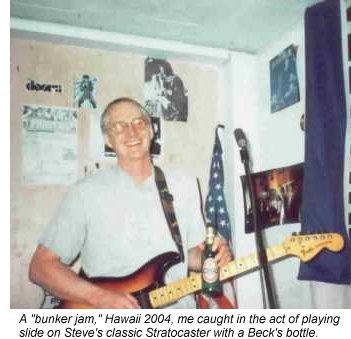

|
| weblog/wEssays | home | |
|
The Strolling Bones: Rock of Ages (November 16, 2005) Imagine, if you are old enough to do so, a stadium in 1965 filled with adoring fans young and old alike, cheering for a band which had introduced their sound 40 years before. What band started in 1925 could have filled such a stadium in 1965? The answer is: no band which started playing "their music" in 1925 could have filled more than a smoky club filled with senior citizens reliving the music of their youth. Yet today, in the glorious year of 2005, many thousands of fans who were infants or not yet a twinkle in their parents' eyes, flock to see the Rolling Stones, affectionately known to those of us of a certain age as the Strolling Bones, a band which burst on the scene in 1965, fully 40 years ago. Here is a glowing review of their recent gig in SBC Park in San Francisco in the S.F. Chronicle. Could a 62-year old jazz great fill a vast stadium with fans today? Nope--the (now smoke-free) club gig is all he or she could hope for.  Meanwhile, just down the road in San Jose, Sir Paul McCartney, age 62, filled another stadium of fans
paying major bucks to see one of the last living Beatles perform real live Beatles tunes. This is
certainly a unique time in musical history, for the entertainment section of any major newspaper gives
anyone alive in the 70s a serious case of flashback. The bands of your youth--even the "classic" bands
which were already "old"--are still filling the seats: The Moody Blues, Bonnie Raitt, Richard Thompson,
Peter Frampton, James Brown, Smokey Robinson, The Temptations, Tower of Power--this is just a selection
from recent weeks, never mind Mick and the crew or Sir Paul. Then there's Aerosmith, Jimmy Buffett, Gordon Lightfoot,
Tom Jones, The Eagles, Santana, Cream, Hall & Oates, even Dylan, for goodness sakes--the list of acts which launched their music in the 60s or 70s who
are still drawing huge crowds goes on and on.
Meanwhile, just down the road in San Jose, Sir Paul McCartney, age 62, filled another stadium of fans
paying major bucks to see one of the last living Beatles perform real live Beatles tunes. This is
certainly a unique time in musical history, for the entertainment section of any major newspaper gives
anyone alive in the 70s a serious case of flashback. The bands of your youth--even the "classic" bands
which were already "old"--are still filling the seats: The Moody Blues, Bonnie Raitt, Richard Thompson,
Peter Frampton, James Brown, Smokey Robinson, The Temptations, Tower of Power--this is just a selection
from recent weeks, never mind Mick and the crew or Sir Paul. Then there's Aerosmith, Jimmy Buffett, Gordon Lightfoot,
Tom Jones, The Eagles, Santana, Cream, Hall & Oates, even Dylan, for goodness sakes--the list of acts which launched their music in the 60s or 70s who
are still drawing huge crowds goes on and on.
My point is simply this: if music is so great nowadays, why are 35 and 40-year old bands filling stadiums which only a handful of current bands can fill? Lest you think I'm just another hippie Boomer having a gray-haired ponytail moment (alas, I cut that off long before it went gray), please tell me with a straight face that Coldplay or 50 Cent or (insert the name of your fave band of the moment) is going to fill a stadium of fans old and young in 2045--yes, 40 years hence. Yes, there's good music being made today, often very good music--Coldplay, Green Day, Death Cab for Cutie, Taking Back Sunday, Lagwagon, and hundreds of other bands--but the question remains: will anyone 40 years from now pony up a buck to see these bands, especially young fans who aren't just reliving their youth? Let's be kind and simply say that these bands will all be long forgotten in 20 years, never mind 40 years. And why is this so? The conclusion is rather obvious: their music is all derivative. It is neither fresh nor signally creative. There is no "Abbey Road" or "Revolver" or "Exile on Main Street" today. You might argue that U2's "Joshua Tree" will make the cut, and you might possibly be right. But then again, U2 may well be as obscure as XTC in 2028, 40 years after their prime. Will their music stand alongside Hendrix, Marley, Lennon or those others who have already withstood the test of nearly four decades? I doubt it. But don't blame me for pointing out the obvious: your iPod holds 10,000 songs, but most of them are derivative retreads which will be forgotten, and for good reason, in a few short years. Don't take it personally; we can't all grow up in times of musical innovation and greatness. Just enjoy the Rock of Ages classics for what they are: classics. * * * copyright © 2005 Charles Hugh Smith. All rights reserved in all media. I would be honored if you linked this wEssay to your site, or printed a copy for your own use. * * * |
||
| weblog/wEssays | home |